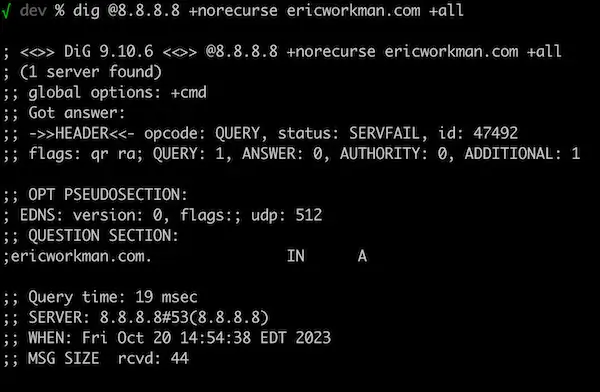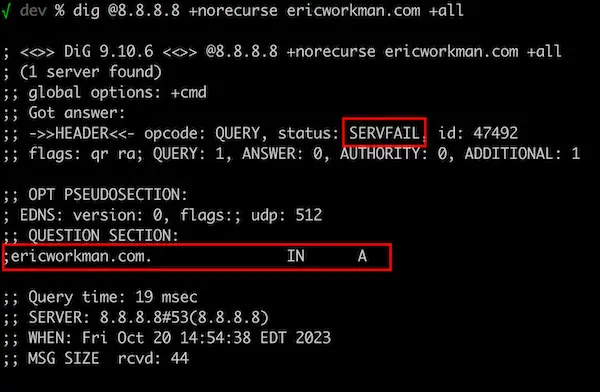Visual Scanning
- Published on
I <3 Julia Evans's content. Seriously, go read, dig in, and learn you some stuff for great good. Her zines are great, too. I want to focus on a small mention in her latest post and Strange Loop talk Making Hard Things Easy: "eraser eyes". This idea of focusing on only the necessary part of an output or response strikes a deep resonance with me, and I see others in different contexts do the same thing. Let's dig into it.
The example she uses is the verbose output of dig, a command-line tool used to query DNS. I love this example, as I developed this skill on the output of dig and general error messages. Let me repeat her command and highlight here so I can talk clearly about it.
Do you know how much of that output I normally use when I'm debugging almost all issues with DNS? Even when I was debugging dynamic cross-datacenter interal DNS via Consul? This much
Julia calls this "eraser eyes", but I've never had a fun name for it. I've always thought of it as being able to visually scan output. However, today I realized someone else was doing the same visual scanning in a totally different context. Check out this Retromation Brotato video, or any of his recent Brotato runs. Throughout the run, you'll see him pause the game after a new wave, hover over one of his weapons or his items, and after a split-second, continue the run while talking about whatever piece of data he was inspecting. He's using eraser eyes while checking for critical chance or other aspects of his character's build, ignoring everything but the one piece of information he wants.
Compare this to first-time runs or streamers that play new or new-to-them games. Often there's an overload of information -- missed details, overlooked interactions, being wrong about what a stat means, or much more obviously, having to read whole descriptions. I think we do this when driving to the extreme. We ignore signs that aren't relevant to our goal, such as turning signs when we're going straight or information signage when we already know where we're going.
This is a useful trick, and one that is repeated across crafts and contexts. It doesn't happen for free through -- the price I think is hours and hours in the thick of things. Julia spent 10 years learning DNS. Retromation has put thousands of hours into the game. I put hundreds of hours into DNS-based issues (if not 10 years, too). That level of familiarity lets you know what's important and what's not, or where the information you want is, or exactly how deep down a rabbit hole you need to go.
And conversely, I think you can tell often that someone is an expert by whether or not they know what to ignore.

